| Reviews & Columns |
|
Reviews DVD TV on DVD Blu-ray 4K UHD International DVDs In Theaters Reviews by Studio Video Games Features Collector Series DVDs Easter Egg Database Interviews DVD Talk Radio Feature Articles Columns Anime Talk DVD Savant Horror DVDs The M.O.D. Squad Art House HD Talk Silent DVD
|
DVD Talk Forum |
|
|
| Resources |
|
DVD Price Search Customer Service #'s RCE Info Links |
|
Columns
|
|
|
Telling Stories - The Comic Book Creators
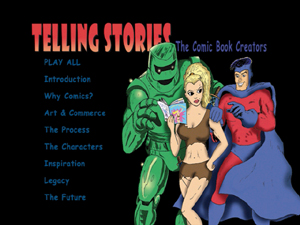
I've worked in comic books for a while, first as an editor and now as a writer.* From my experience, it is an occupation that most people outside of the field find terribly perplexing. If I am at a social gathering and the topic of jobs comes up, the other person is always extremely curious how comics are put together. As Howard Chaykin explains in the documentary Telling Stories: The Comic Book Creators, his mother never understood the difference between what it meant to read a comic book and make a comic book, and he is one of the mavericks of modern graphic literature. If his mother can't figure it out, what chance do any of you have?
So, a documentary like Telling Stories is a good step in the right direction. There aren't a lot of movies about the making of comic books out there, and as much as I love Crumb, in some ways it's a little like judging the entire aviation industry on films about the latter years of Howard Hughes. Unlike motion pictures, which regularly open up the process for the common man on the bonus features of DVDs, comics don't really have an explanatory outlet.
Director Greg Jurls starts right by bringing together an interesting mix of people for Telling Stories. Jurls makes sure different time frames are covered: Arnold Drake began his career in the 1940s, while Steve Englehart rose to prominence in the '70s and Geoff Johns is one of the top writers in the industry right now. The participants also have different jobs in the industry. Howard Chaykin both writes and draws, while Greg Rucka exclusively writes, and Adam Hughes mainly does cover illustrations while Bruce Timm is known for his work on cartoons like Batman: The Animated Series. Cartoonist and scholar Trina Robbins even throws in the female perspective, though the irony of her noting how women are often left out of comic book histories in a film where she is the only woman represented is a hard one to miss. Though the film ends with Rucka calling for an eradication of comic book stereotypes, Telling Stories could have strayed a little farther from the standard white guy paradigm (which is finally shifting in the comic book business at large).
The greatest strength of Telling Stories is its information. All the people interviewed are well-versed in comic book history and eager to discuss their craft. Jurls and editor Damon Crump try to shape a natural arc out of the subjects broached, linking together why people got into the industry, what has inspired them to keep going, relationships with the audience, and the challenges inherent in working on established properties versus one's own, etc., and ending Telling Stories with chapters where the creators contemplate their legacy and the future of the art form. It's kind of a rambling structure, but a lot of good stories rise up in the mix. Drake, for instance, is a strong authority on the history of the medium because he arguably created the first long-form comic, It Rhymes With Lust. (I kept hoping Drake would reveal what that rhyme might be; Wikipedia tells me the main character was a femme fatale named Rust.) Chaykin, the creator of such influential '80s comics as American Flagg! and who continues to work on genre-busting material like Bite Club, is probably the most intriguing. His has the easygoing manner of a natural raconteur, and his stories couple a genuine self-effacement with a solid understanding of what makes his work vibrate differently than everyone else's. He has some of my favorite quotes in Telling Stories, such as when he notes his odd position in the industry by saying, "There's Democrats, Republicans, and me." I also like his description of how he approaches the blank page, saying it "starts with structure and outrage." That soundbite is a bright spot in an otherwise familiar discussion of how each individual gets started. When are people going to learn that "Where do you get your ideas?" is the world's most boring question without an answer?
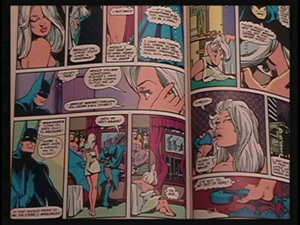
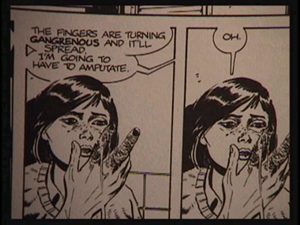
Englehart's Batman and Rucka's Whiteout
The discussions of inspiration and process might have been better served had Jurls busted out of the box he created for himself. All nine interviewees are interviewed in front of the same set, and at least 95% of the movie is composed of static shots of them talking. When Chaykin was describing the various stages of page construction, why not show his studio, show different pieces of something he is working on? When the always affable Jimmy Palmiotti talks about having broken into the industry as an inker, why not show the audience the difference between pencils and inks? Even if the viewership was made up entirely of comic book fans, they'd still find it interesting. Isn't the first rule of journalism to assume your audience is not aware of your subject?
If Telling Stories has a downfall, those two things are it: the documentary is maybe a little too inside for the non-fan to enjoy and not visually exciting enough in conveying a visually exciting medium. Though we do see images from a lot of the books talked about, they don't come often enough or fast enough. Geoff Johns talks about a lot of different characters that we never see, and I was over an hour in before I realized Arnold Drake was the guy who created legendarily strange DC comics like Doom Patrol and the original Teen Titans. There is a small amount of footage shot at a comic book convention, and it would have been nice to get more of that rather than Telling Stories being mainly talking heads. In comic book terms, the phrase "talking heads" is quite often a pejorative. Johns even says he could never see writing a comic book story that takes place in one room, as it wouldn't take enough advantage of the medium. Telling Stories could have used with a good trim on the interviews to scale back the repetition and a little more time away from the interview space.
Even so, if you have a passing interest in comics or are a fan of any of the creative folks involved, there is a lot being talked about in Telling Stories: The Comic Book Creators that you may not have heard before. Plus, all of the writers and artists taking part are passionate about what they do, and so when they talk, it's hard not to listen.
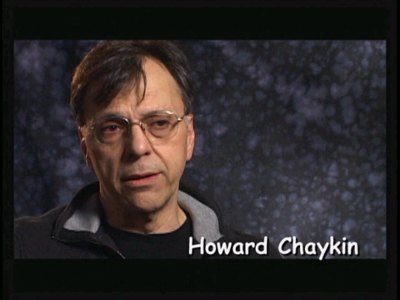
(The availability of Telling Stories and other comic book films by Hero Video is currently somewhat limited. For more information, visit their website: http://herovideoproductions.com.)
THE DVD
Video:
Telling Stories is shown in full frame, though the interviews are actually matted to appear letterboxed (see the above screen image).
Sound:
As this is a documentary of just people talking, there is not a lot of sound to be messed with. That said, there is never a moment where someone can't be heard and understood.
Extras:
There are no extras, but if you'll permit me a tiny rant, I'd like to complain about the cover art of Telling Stories: The Comic Book Creators. Just as I felt the film didn't take full advantage of the dynamic visuals of comic books, it constantly frustrates me when films or books about comics create their own promotional images below the quality of what any self-respecting comic book publisher would commission. The cover of Telling Stories: The Comic Book Creators, which is also used as the image for the DVD menu, is really quite bad. Surely one of the artists in the movie could have been convinced to do something for it?
FINAL THOUGHTS:
Rent It. Though I liked the informative content of Telling Stories: The Comic Book Creators, its self-contained presentation will likely prevent me from going back for a second or third viewing. If the director had opened up the way the comics were talked about and also the scope of how the documentary was shot, he could have made a film that would have had a much wider appeal. Still, as I noted above, if you like comic books or any of these creators strike your fancy, give Telling Stories a spin.
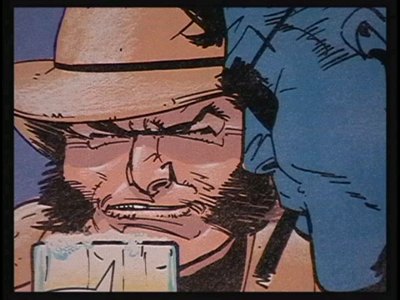
Howard Chaykin comic art
* In the interest of full disclosure, I was once Greg Rucka's editor on Whiteout and Queen & Country, both mentioned in the documentary.
Jamie S. Rich is a novelist and comic book writer. He is best known for his collaborations with Joelle Jones, including the hardboiled crime comic book You Have Killed Me, the challenging romance 12 Reasons Why I Love Her, and the 2007 prose novel Have You Seen the Horizon Lately?, for which Jones did the cover. All three were published by Oni Press. His most recent projects include the futuristic romance A Boy and a Girl with Natalie Nourigat; Archer Coe and the Thousand Natural Shocks, a loopy crime tale drawn by Dan Christensen; and the horror miniseries Madame Frankenstein, a collaboration with Megan Levens. Follow Rich's blog at Confessions123.com.
|
| Popular Reviews |
| Sponsored Links |
|
|
| Sponsored Links |
|
|
| Release List | Reviews | Shop | Newsletter | Forum | DVD Giveaways | Blu-Ray | Advertise |
|
Copyright 2024 DVDTalk.com All Rights Reserved. Legal Info, Privacy Policy, Terms of Use,
Manage Preferences,
Your Privacy Choices | |||||||













